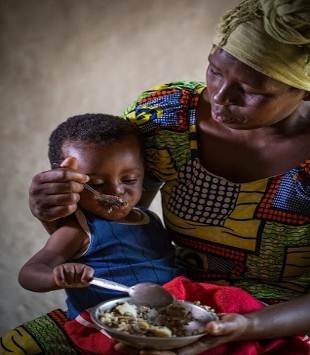
June 2014—While Rwanda has made dramatic progress in decreasing child mortality, chronic malnutrition remains high among children under the age of 5. This hurts not only the economy, but also the welfare of the young. Some people are standing up against the odds, however, taking on the fight against malnutrition.
One such person is Verdiane Mushimiyimana, 41, who lives in a rural district about two hours outside of Kigali, the capital.
As a mother of five children, Mushimiyimana had a hard time providing good and nutritious meals to feed her family. Having seen four of her children grow without enough nutritious foods, she was determined to provide enough for her fifth born, Aimable. Now a bouncing 1-year old baby boy, Aimable has benefitted from six-month exclusive breastfeeding and complementary feeding.
Verdiane learned valuable lessons from her community nutrition group when she joined in July 2012. Her group is one of 436 established in eight of Rwanda’s 30 districts by USAID’s Ejo Heza, or “brighter future,” program, which works to improve livelihoods and food consumption of 75,000 Rwandans, particularly women.
“My last child, Aimable, was born when I was in the USAID Ejo Heza nutrition group. He received proper nutrition and proper health care due to the education I received,” said Mushimiyimana.
The lessons from the nutrition group were also extended to her wider family as all members enjoy a better welfare. “In the last two years with the USAID Ejo Heza nutrition group, I have not had any disease cases in my family,” she said.
Through the program’s integrated approach, beneficiaries like Mushimiyimana also receive agricultural information that promotes kitchen gardening and improved food handling.
USAID’s five-year, $13 million Ejo Heza program began in 2011 and is implemented by Global Communities. The program aims to improve rural nutrition and livelihoods by increasing the supply of and demand for financial services and by improving nutrition behaviors and agricultural practices.
Links
Follow @USAIDRwanda, on Facebook, on Flickr







Comment
Make a general inquiry or suggest an improvement.